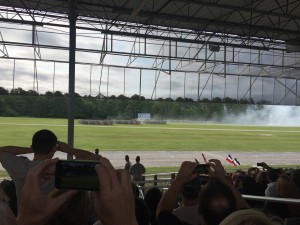
Family Day, Ft. Jackson, SC.
We flew out of Duluth on a Tuesday morning. Earlier in his junior year, our 17-year-old son, Jack Bridger Munger had mulled over joining the military. He considered enlisting in the United States Marine Corps Reserve. Then, as he researched his options, in a very mature and thoughtful way, showing contemplative skills not often apparent in a teenager, Jack made appointments for us to sit down with Army Reserve and Minnesota Army National Guard recruiters. In the end, Jack enlisted in the Army Guard. He began drilling with his unit in Duluth while still a junior at Hermantown High School anticipating a summer, not of hot blonds and beaches and youthful angst, but spent at basic training at Ft. Jackson, SC. His was not an impetuous or flirtatious decision, but one grounded upon thorough discussion, reason, and discourse between a child and his parents. Were we nervous that our fourth son, our youngest progeny, was selecting a career, even a part-time one, in the military? Given the state of the world, the answer is “yes”. Did we try to dissuade him from his chosen course? The answer is a definite “no”.
Rene’ and I have never been to South Carolina. I had a relative, a cousin, who once lived there. But beyond that tangential connection and the fact that the Civil War started there (at Fort Sumter) and that recent events in an African Methodist Episcopal Church in historic Charleston were tragic (and based upon one man’s hate and residual racism, a disgust for folks different from him only in the pigmentation of their skin; his evil disdain manifested through his deification of the Battle Flag of Northern Virginia (for the flag universally believed to be the “official” flag of the CSA is indeed, not that at all, see https://en.wikipedia.org/wiki/Flags_of_the_Confederate_States_of_America)), I had little understanding of the place Jack had spent ten hot, humid weeks. To say that I was ready to be underwhelmed by Columbia, the state’s capital and the largest city in the Palmetto State is an understatement. I came to South Carolina carrying a large measure of northernistic chauvinism. I left with a quite different impression, my visions of squalor and poverty and turmoil and oppressively humid heat replaced by the simple notion that folks in Columbia, like folks in Duluth, for the most part, are trying to do the right thing, trying to get along. The old saying that “one bad apple can spoil the whole bunch” might be true in terms of one’s perception of a place and a people but it is decidedly unfair to paint an entire city or state or region with the brush of one man’s evil. In short, Columbia turned out to be a lovely place, set in a lovely natural setting. I may not understand the dynamics of race in South Carolina, or be able to comprehend why it took a Republican legislator, with familial roots set deep in the Confederacy (Rep. Jenny Horne), along with an immigrant daughter of India (Governor Niki Halley) to convince a recalcitrant state legislature to do the right thing and remove the Battle Flag of Northern Virginia from the pole in front of the capitol. But I can say this: Columbia and South Carolina are places I enjoyed visiting.
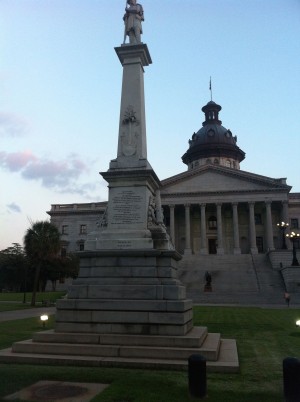
State Capitol, Columbia, SC.
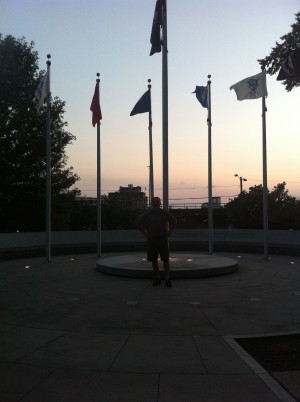
Memorial to Five Services, SC capitol grounds.
We spent our first hot, tortuously wet evening walking from our hotel to the capitol building to see what all the commotion had been about. The battle flag, adopted years ago by the veterans of the Confederate Army as their standard then lost to the mists of time as the veterans died off only to be reclaimed by various groups, some overtly racist, some less obviously so, as a symbol of opposition to the Civil Rights Movement during the late 1940s and early 1950s, as well as the flags standard, its concrete base, the lawn surrounding it, and the wrought iron fence are gone. The statue (see picture at right) honoring the Confederate war dead remains. But so too does a more subtle, more tender memorial tucked away in the palmettos and pines of the capitol grounds. I stood, as the sun was setting behind me, amongst flags honoring my son’s decision and similar decisions made by countless other sons and daughters over the course of American history, considering the sacrifices made by our men and women in uniform. Tears formed. My heavy heart, a heart filled with preconceived notions about a place and a people that I’d never personally experienced, lifted.
The next day was family day at Ft. Jackson and, for the first time in over two months, we saw Jack. I couldn’t pick him out of the 1,300 soldiers marching out of the smoke at the far end of the parade deck. I wasn’t able to find him standing in his platoon when parents and other loved ones in the stands were released to seek out their soldiers. But when he tapped me on the shoulder and gave me a bear hug, I felt it. My son has changed. Don’t get me wrong. I am not one to expect miracles. What had transpired was that the fortitude and grit and personal integrity omnipresent in our son (but masked by adolescence) had been revealed as layers of youthful resistance were stripped away by lack of sleep, angry drill sergeants, and constant hustle. I experienced a similar transformation when I went to Ft. Dix as a relatively old twenty-six year old grunt and, in that first embrace from Jack on that steamy morning at Fort Jackson, I knew he had too.
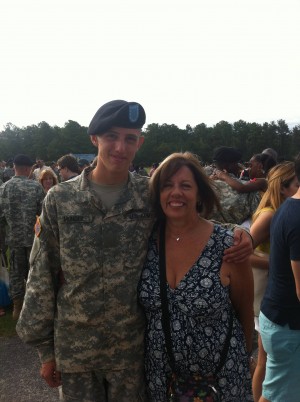
Private Jack Munger and his mom, Family Day, Ft. Jackson.
Jack spent Family Day showing us around Jackson. We shared a picnic lunch by a little lake, spent some time watching small mouth bass leap in the torridly hot air at a park tucked into the gleaming broad leaf and southern pine forest on the far northern edge of the fort, toured a museum, and ate dinner together at the NCO Club. As dusk claimed the day, we said goodnight, fully appreciative that tomorrow, graduation day, would be a very tearful and joyous occasion. Jack returned to his quarters. Rene’ and I drove back to our hotel.
That night, I considered the family day ceremony I’d witnessed. Twenty foreign nations and cultures (including Canada) were represented in the young folks who had stood at attention before the overflowing bleachers. The immigrants had collectively raised their right hands and pledged an oath of citizenship to the United States of America. The newly christened were making a choice, a choice to serve their adopted country. They came in all shapes and sizes and shades of pigmentation. I couldn’t help but wonder what the shooter at the church in Charleston would make of it all, given his hatred for anything different from his warped, simplistic view of America. I went to sleep that evening with a smile on my face, confident in the knowledge that, as my own drill instructor repeatedly said during my own basic training, “The only color the Army knows is green.”
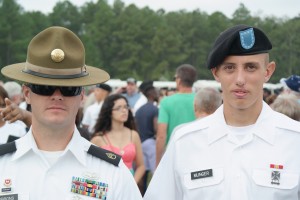
Graduation Day. Pvt. Munger and his Drill Sargent.
After graduation, we took Jack to the airport and waited with him until it was time for him to board his plane. After seeing our son off, Rene’ and I visited stately mansions and drove through leafy, lush southern pine forests. We walked around the edges of the University of South Carolina campus and had a great meal at a local Italian eatery, the restaurant’s sophistication meant, I am sure, to overcome the impressions of the south that northern tourists arrive here burdened with. The people of Columbia that we interacted with; black, white, Asian, and every color in between, were thoughtful, helpful, and well, Americans, just like us.
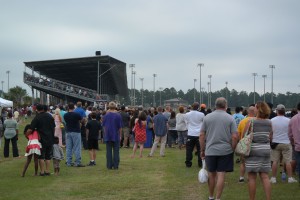
Crowd watching graduation, Ft. Jackson, SC.
I came to South Carolina to see what my son had learned from his experience at Fort Jackson. In the end, it was the old man who learned something about himself. Someday, Rene’ and I will go back to Columbia and take in Ft. Sumter and Charleston and the rest that South Carolina has to offer in the way of history, culture, and scenery. The next time I visit the Palmetto State, I’ll remember to leave my own prejudices and preconceived notions at home.
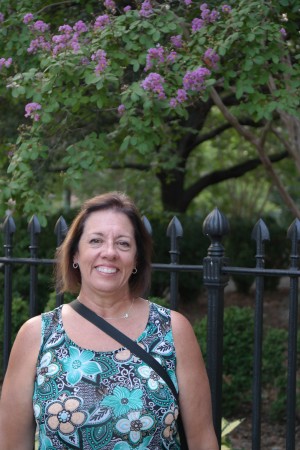
Rene’ in Columbia, SC
Peace.
Mark
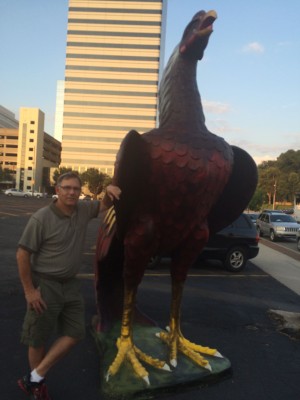
Mark with the SC Gamecock.


